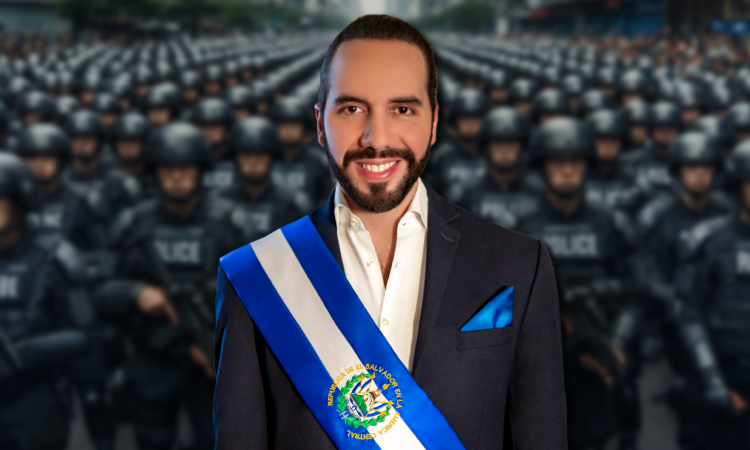As violence has escalated elsewhere in Latin America, Salvadoran President Nayib Bukele’s heavy-handed methods against criminality have earned approval across the region. Aiming to emulate him, emerging authoritarian leaders could jeopardize the rule of law.
On February 4, 2024, Bukele won the presidential race with 81 percent of votes, despite the Salvadoran Constitution explicitly and repeatedly prohibiting reelection. The voter turnout was 53 percent, one percentage point higher than in 2019. Although the Supreme Court of Justice dubiously allowed his candidacy, Bukele’s voter support is undeniable due to his effective measures to combat gangs.
The proof is in the pudding: leftist candidate Manuel Flores from the FMLN Party and conservative Joel Sánchez from the ARENA Party garnered 6 and 5 percent, respectively. Moreover, Bukele’s political party “New Ideas” got an overwhelming majority of 54 seats, out of 60, in the Legislative Assembly.
This is no surprise. For three decades, traditional parties have failed to address the main citizen concern: criminality. Their corruption scandals have gifted Bukele the independent option. Bukele’s consequent power consolidation has brought the traditional parties to the verge of extinction.
As a result of these electoral results, Bukele and his caudillo party will rule El Salvador without checks and balances, including free rein to pack the judiciary.
Bukele’s Heavy-Handed Methods
El Salvador’s crime rate has plummeted since Bukele came to office in 2019. From the record high of 106 homicides per 100,000 inhabitants in 2015, the rate reached its record low of two homicides per 100,000 inhabitants in 2023. El Salvador has turned into the safest country in the region, while neighboring Honduras and Guatemala remain at rates of 31 and 16 homicides, respectively.
Bukele has managed to provide peace back where going out for a coffee was a deadly risk. However, to achieve it, Bukele has declared an ongoing state of emergency for over 20 months, which is unconstitutional. In his crusade, he has illegally removed judges and prosecutors to replace them with loyal servants.
In the process of dismantling the criminal structure of Salvadoran gangs, citizens are paying for the sins of others. Bukele’s administration tacitly acknowledged the unwarranted imprisonment of 7,000 people in August 2023 by releasing them. For Public Security Minister Gustavo Villatoro, “their release demonstrates the judicial system is working.”
However, if the judicial system respected the presumption of innocence they would not have been there in the first place. Salvadoran citizens lack constitutional guarantees; most detainees are judged in collective trials; and anonymous accusations are sufficient evidence to jail someone.
In El Salvador, the presumption of innocence has been evaporating swiftly: one tends to be assumed guilty until he proves the opposite. According to the University of London’s World Prison Brief—an online database on prison systems worldwide—El Salvador has the highest incarceration rate in the world. By the end of 2023, 1.6 percent of the Salvadoran population was in jail or prison.
A Bukele in Every Corner of the Region
Due to the effective gang disarticulation led by the so-called millennial president, plenty of Salvadorans see him as a kind of messiah. A publicist by profession, Bukele first took advantage of popular discontent with traditional politics and achieved political gain by showcasing a disruptive image of himself. Once he secured the votes, he started using political institutions at his whim.
As Impunity Observer Editor at Large Steve Hecht has asserted, “Violence wears people down, leads them to crave stability, and prepares them for the severe and arbitrary justice that characterizes totalitarianism.”
After living in the hell of criminal-gang dominance, one can understand why people have chosen to support Bukele and embrace authoritarianism as a rapid escape. Collapsing institutions and legitimate crisis scenarios invite extreme measures. However, the long-term ramifications are ominous. If the goal is to relieve countries of the law of the jungle and relentless criminality, the rule of law must be the path, rather than heavy-handedness and personality-driven enforcement.
As criminality becomes less of a pressing concern, Salvadorans will want their civil liberties back. Their restoration seems unlikely any time soon, and calls for it will reveal Bukele’s true colors.
Insecurity is already no longer the top concern in El Salvador. It is now the economy. With public debt accounting for 80 percent of GDP, El Salvador is the most indebted country in Central America.
In the past five years, the GDP has grown at a modest rate of 2 percent, and the poverty rate has remained at 30 percent. Unfortunately, foreign investment has waned, even though Bukele tried to attract capital with incentives for bitcoin users.
Before emulating Bukele and his heavy-handed methods, it is appropriate to analyze all sides of the story. Any such dialogue must go beyond the short-term results on security.
It is too soon to call Bukele a dictator akin to Nicolás Maduro in Venezuela, Daniel Ortega in Nicaragua, and Miguel Díaz-Canel in Cuba. However, his authoritarian approaches have laid the groundwork for a dictatorial government.
All that glitters is not gold. As Lord John Dalberg-Acton famously noted in one of his letters to bishop Creighton: “Power tends to corrupt, and absolute power corrupts absolutely.”
This article reflects the views of the author and not necessarily the views of the Impunity Observer.
 Join us in our mission to foster positive relations between the United States and Latin America through independent journalism.
Join us in our mission to foster positive relations between the United States and Latin America through independent journalism.
As we improve our quality and deepen our coverage, we wish to make the Impunity Observer financially sustainable and reader-oriented. In return, we ask that you show your support in the form of subscriptions.
Non-subscribers can read up to six articles per month. Subscribe here.

